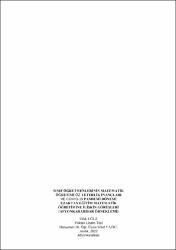Sınıf öğretmenlerinin matematik öğretimi öz yeterlik inançları ve covıd-19 pandemi dönemi uzaktan eğitim matematik öğretimine ilişkin görüşleri (afyonkarahisar örneklemi)
Künye
Covid-19 Pandemisi Uzaktan Eğitim Sınıf Öğretmenleri Matematik Öğretimi Öz Yeterlik İnançları.Özet
Araştırmada, sınıf öğretmenlerinin matematik öğretimi öz yeterlik inanç düzeylerinin belirlenmesi ve COVID-19 pandemi dönemi uzaktan eğitimin matematik öğretimine etkisinin ortaya çıkarılması amaçlanmıştır. Bu amaç doğrultusunda, sınıf öğretmenlerinin matematik öğretim faaliyetinin etkili unsurlarından biri olan öz yeterlik inanç düzeyleri ve özel bir süreç olarak COVID-19 pandemi dönemi uzaktan eğitimde matematik öğretimine yönelik görüşleri bütüncül bir bakış açısı ile ele alınmıştır. Araştırmanın bu noktalarda matematik öğretimine katkı sağlayabileceği düşünülmektedir. Araştırmada, karma araştırma yöntemlerinden açıklayıcı sıralı desen kullanılmış; nicel boyutu tarama modelinde, nitel boyutu ise durum çalışması deseninde yürütülmüştür. Araştırmanın çalışma gurubunu, 2021-2022 eğitim öğretim yılında Afyonkarahisar Milli Eğitim Müdürlüğüne bağlı okullarda görev yapan sınıf öğretmenleri oluşturmaktadır. Buna bağlı olarak, nicel çalışma gurubu basit tesadüfi örnekleme yöntemi kullanılarak belirlenen 580 sınıf öğretmeninden oluşurken, nitel çalışma grubu ise amaçlı örnekleme yöntemlerinden maksimum çeşitlilik kullanılarak belirlenen 104 sınıf öğretmeninden oluşmaktadır. Araştırmanın nicel verileri Hacıömeroğlu ve Şahin-Taşkın (2010) tarafından Türkçe’ye uyarlanan “Matematik Öğretimi Öz Yeterlik İnanç Ölçeği” kullanılarak elde edilmiştir. Nitel verileri ise araştırmacı tarafından geliştirilen açık uçlu anket formu ile toplanmıştır. Nicel verilerin analizinde; betimsel istatistikler, t-testi ve ANOVA testi uygulanmıştır. Ayrıca, ANOVA sonunda farkın kaynağını tespit etmek amacıyla Post-Hoc testlerinden Tukey HSD testi uygulanmıştır. Nitel verilerin analizinde ise içerik analiz yöntemi kullanılmıştır.
Araştırmada nicel verilerden elde edilen sonuçlara göre, sınıf öğretmenlerinin matematik öğretimi öz yeterlik inanç düzeylerinin yüksek olduğu tespit edilmiştir. Sınıf öğretmenlerinin matematik öğretimi öz yeterlik inançları cinsiyet, eğitim durumu, mesleki görev süresi ve okutulan sınıf seviyesi değişkenleri açısından farklılık göstermediği, görev yeri değişkeni açısından ise il merkezinde görev yapan öğretmenler lehine farklılık gösterdiği tespit edilmiştir. Nitel verilerden elde edilen sonuçlara göre, sınıf öğretmenlerinin uzaktan eğitimin ortaya çıkardığı yetersizliklere daha çok vurgu yaptığı, uzaktan eğitimde öz yeterlik sağlamada zorlandıkları derslerin başında matematik dersinin bulunduğu, ders konularının başında ise geometrik şekiller ve cisimler geldiği tespit edilmiştir. Uzaktan eğitim matematik öğretiminin sınıf öğretmenlerinin materyal kullanma öz yeterliklerine genel olarak katkı sağladığı, yöntem-teknik kullanımında ise geleneksel yaklaşımları sürdürdükleri görülmüştür. Sınıf öğretmenleri uzaktan eğitimin matematik öğretimine çok az katkı sağladığı, uzaktan eğitim matematik öğretiminde daha çok sorunlarla karşılaştığı görülmüştür. Fakat, sınıf öğretmenleri uzaktan eğitim matematik öğretiminde karşılaştıkları sorunlara yönelik çeşitli çözüm yolları ürettikleri belirlenmiştir. Son olarak, uzaktan eğitimin sınıf öğretmenlerinin matematik öğretim öz yeterliklerine genel olarak katkı sağladığı belirlenmiştir. In the research, it was aimed to determine the mathematics teaching self-efficacy belief levels of classroom teachers and to reveal the effect of distance education on mathematics teaching during the COVID-19 pandemic period. For this purpose, which is one of the effective elements of the instructional activities of classroom teachers self efficacy beliefs as a process, levels and special COVID-19 pandemic period for the teaching of mathematics in distance education with a holistic perspective that views are discussed. It is thought that the research may contribute to mathematics teaching at these points. In the research, an explanatory sequential pattern was used from mixed research methods; the quantitative dimension was carried out in the screening model and the qualitative dimension was carried out in the case study pattern. The study group of the research consists of classroom teachers working in schools affiliated to the Afyonkarahisar Directorate of National Education in the 2021-2022 academic year. Accordingly, the quantitative study group consists of 580 classroom teachers determined using the simple random sampling method, while the qualitative study group consists of 104 classroom teachers determined using the maximum variety of purposeful sampling methods. The quantitative data of the research were obtained by using the “Mathematics Teaching Self-Efficacy Belief Scale” adapted to Turkish by Hacıömeroğlu and Şahin-Taşkın (2010). The qualitative data were collected with the open-ended questionnaire developed by the researcher. In the analysis of quantitative data; descriptive statistics, t-test and ANOVA test were applied. In addition, the Tukey HSD test, one of the Post-Hoc tests, was applied to determine the source of the difference at the end of the ANOVA. Content analysis method was used in the analysis of qualitative data.
According to the results obtained from quantitative data in the research, it has been determined that the self-efficacy belief levels of classroom teachers in mathematics teaching are high. The classroom teacher of mathematics teaching self-efficacy beliefs, gender, educational status, occupational tenure and taught the class-level variables does not differ in terms of the post variable has been found to differ in terms of teachers in the province in favour of. The results from the qualitative data, according to his revealed inefficiencies of teachers of distance education more emphasis, distance education, self-sufficiency that they had difficulty in achieving the courses at the beginning of a math class where it exists, it is found that at the beginning of this class and objects in geometric shapes. It has been observed that distance education mathematics teaching contributes to classroom teachers' self-efficacy in using materials in general, while they maintain traditional approaches in the use of methods and techniques. It has been observed that classroom teachers make little contribution to distance education mathematics teaching, and face more problems in distance education mathematics teaching. However, it has been determined that classroom teachers produce various solutions to the problems they encounter in distance education mathematics teaching. Finally, it has been determined that distance education contributes to the mathematics teaching self-efficacy of classroom teachers in general.
Bağlantı
https://hdl.handle.net/11630/10305Koleksiyonlar
- Yüksek Lisans Tezleri [1638]



















